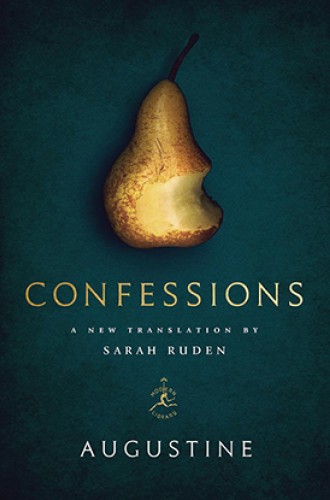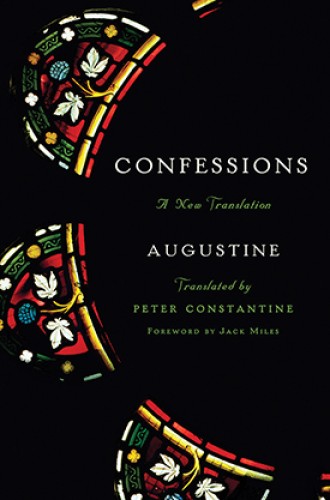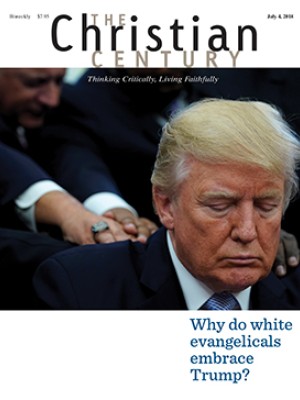Letting Augustine be Augustine
How to capture the urgency of Confessions? New translations by Sarah Ruden and Peter Constantine offer very different approaches.
I try to squeeze Augustine’s Confessions into many of the courses I teach. Sometimes this works out pretty well. I once spent a semester inviting first-generation college students on the southwest side of Chicago to relate Augustine to domestic abuse, gang violence, and teenage pregnancy. You might be surprised how many issues students share with a North African bishop who lived 1,600 years ago.
But for many students, simply making sense of the variety of topics Augustine covers can be a stumbling block. A good translation from the Latin might help open students’ eyes to the method in the madness, while a bad translation might turn them off of Augustine for good. There is a lot riding on this choice, which becomes more intimidating when you consider that Confessions is one of the most frequently translated texts in history.
Read our latest issue or browse back issues.
Two new entries in an already crowded marketplace come from Sarah Ruden and Peter Constantine. Ruden, a classicist, brings a keen historical eye for language. Constantine, who usually translates literary works, aims instead to bring out the timeless beauty of Augustine’s prose.
This distinction in background plays out in their different approaches. Ruden tends toward iconoclasm. Reminding us that Augustine was a man of the Roman Empire, she aims to read him that way, freed of modern “dictates on what is proper.” She wants to let Augustine be Augustine, even if that’s objectionable to today’s tastes. Constantine’s goal is just to repackage a classic attractively.
The first nine books of Confessions are full of episodes calling for further reflection. When Augustine in book 2 remembers stealing pears as a kid, he digs up the gnarled roots of sin itself. When in book 4 an unnamed friend dies unexpectedly, he interrogates his own life.
In Constantine’s hands, the pear scene involves “wicked youths” being “wicked for no reason.” That’s accurate, but the choice of “wicked” implies a didactic, puritanical tone. Ruden aims to bring the scene to life, yet she too stumbles into stuffy anachronisms: “young men, full of our endless mischief,” were being “evil entirely on the house.” She’s headed in the right direction, even if her execution falls short. Teens, peer-pressured every day, should be able to relate to Augustine’s petty crime. They’d more likely relate to Ruden’s version than Constantine’s, but the lingo (“on the house”) might still throw them off.
When Augustine’s friend dies, Constantine offers a conventional take. By loving his mortal friend as if he would never die, Augustine reflects, he wastefully “poured” his “soul onto the sand.” Ruden, however, gets visceral. She points out that this sand metaphor evokes blood-and-guts gladiators. Augustine had “bled” his “soul out onto the sandy floor of the arena.” He had gone to war with human mortality itself and lost.
Augustine’s interrogation of his own motives soon turns into a questioning of his own self. Constantine, maybe thinking of 1 Corinthians 13:12, translates the passage this way: “I became a great enigma to myself.” Ruden gives: “I became my own elaborate investigation.” At first, this word choice seems odder than Constantine’s “enigma,” but Ruden is standing on firm ground. The Latin quaestio does evoke a process of seeking out. Augustine is not just asking questions about himself; he’s in search of himself. Ruden’s choice is bold yet evocative.
Augustine calls himself a “question” again later on as he worries about whether he might be enjoying the hymns of the church a bit too much. Yes, the lyrics are edifying. But does he love the songs for their content or for their singsongy seduction? Once more, he’s become (for Constantine) an “enigma” and (for Ruden) a “puzzle.” It’s surprising that Ruden shifts from “investigation” to “puzzle,” and her choice brings her closer to Constantine’s “enigma.” It’s fair game, since in the preface she reserves the right to vary translations of the same term. But it’s a bit puzzling. The pressing nature of Augustine’s self-interrogation drops out. We’ve gone from a cross-examination to a Rubik’s Cube.
If there’s a drawback shared by both translations, it’s a tendency to drain the urgency out of Augustine’s words. What could be more urgent, for example, than the conversion scene in book 8? Years of self-questioning bring Augustine to a breaking point: he wants to change his ways, but he can’t. Or maybe he doesn’t really want to. He wants to and doesn’t want to at the same time. How can he get out of that double bind? It’s no longer a problem of wanting it badly enough. Approaching an impasse, he crumbles into a nervous wreck.
In Constantine’s version, Augustine says, “I was in dispute with myself and scattering myself, and this destruction befell me against my will; yet it did not bespeak the presence of the nature of another mind, but the punishment of my own.” All the urgency is here hidden behind churchmen’s words like “befell” and “bespeak.” Ruden’s Augustine says, “I was inwardly at war and being laid waste by myself; yet this devastation was happening against my will. Nevertheless, this didn’t characterize a mind as a thing apart; rather, it showed the punishment of my own mind.” The warlike terminology is an improvement, but the tone remains detached with locutions like “characterize a mind as a thing apart.” Augustine is undergoing psychological trauma in that garden, not casually reflecting on the philosophy of mind.
After the first nine books Augustine leaves autobiography behind. Readers regularly question what’s going on in books 10–13. Why can’t Augustine just tell us his life story and be done with it? That’s what most modern memoirists would do. But Augustine’s no modern memoirist. For him, human life must be understood within the context of a divinely created cosmos.
Accordingly, books 10–13 explore what it feels like to live in a world shaped by a timeless Creator. That is why he includes reflections on Genesis 1:1 (books 12–13), as well as on the experience of living in time (book 11) and the mystery of memory (book 10). It’s memory, after all, that allows us to tell stories about our lives in time in the first place.
These last four books remain urgent, even if abstract. In book 11, Augustine expresses how painful it is to live in time. It feels like distentio animi, the stretching apart of our souls. Ruden renders this as “drawing out”; Constantine leaves it at “distention.” Later, when Augustine describes his entire life as distentio, Constantine offers: “my life was dissipating.” Yet Augustine is speaking in the present tense, not about past struggles he’s overcome. His life is being torn apart right now. Ruden’s phrasing is wordy: “my life is overextended and stretched out of shape.”
Neither translation quite grasps the gravity of the situation. It is the weight of time, pulling us back into past regrets and forward into future responsibilities, that makes it so hard to avoid sin, to convert, and to start solving the question of who we really are. Augustine isn’t “overextended” like a lawyer working overtime; his life was and is and will be torn to shreds until he finds that final place of rest.
This is the kind of meaning I hope to draw out of Augustine’s Confessions when I’m sharing it with students. Casual readers, too, should come face to face with its urgency. All too often, Constantine’s version drains the blood out of this text, leaving it lifeless. Ruden’s rendering hits closer to the mark. She could have gone further with her iconoclastic reinterpretation, but her heart is in the right place.
A version of this article appears in the print edition under the title “An ear for Augustine.”







